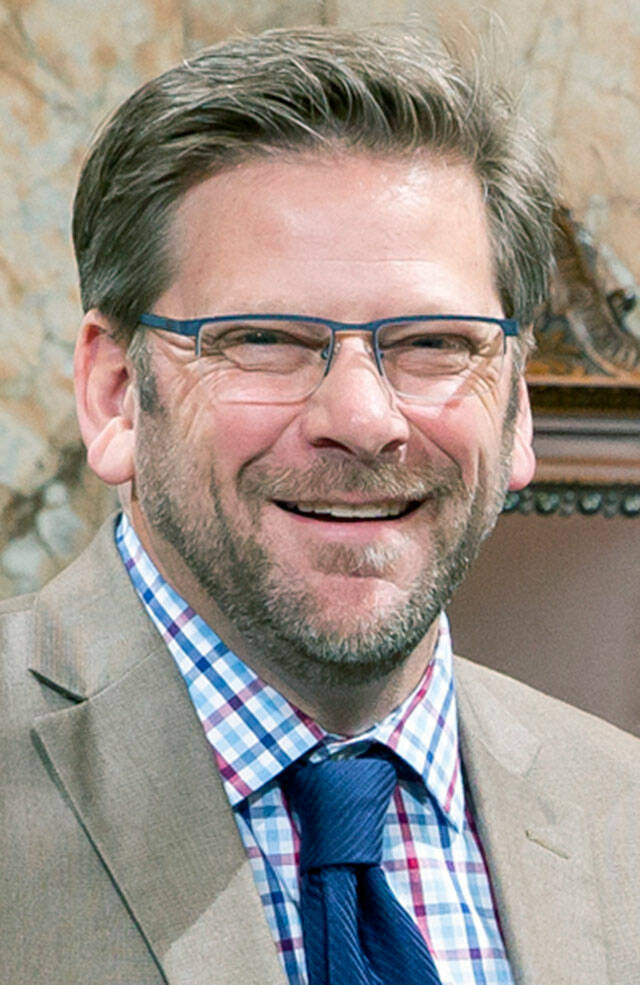PORT ANGELES — State representatives Steve Tharinger and Mike Chapman discussed the housing crisis, public safety and transportation at the Port Angeles Business Association meeting Tuesday.
Both are former Clallam County commissioners who now represent the 24th Legislative District, which covers Clallam and Jefferson counties and a portion of Grays Harbor County.
Tharinger, a Democrat living in Port Townsend, also chairs the House Capital Budget Committee, while Chapman, a former law enforcement officer and a Port Angeles Democrat, chairs the House Rural Development, Agriculture & Natural Resources Committee.
In his opening remarks, Tharinger spoke about some $450 million of state money invested in affordable housing.
He said some of it was used as grants for the All View Motel, 214 E. Lauridsen Blvd. in Port Angeles. The place was purchased by Peninsula Behavioral Health to convert into permanent supportive housing for clients.
“The idea was to be able to purchase property and move folks in within three to four months as opposed to building new properties in three to four years,” Tharinger said.
Some of the funding also was used to invest in the infrastructure necessary for housing.
PABA member Cherie Kidd asked if there will be any state funds made available for landlords. When an already existing housing crisis was exacerbated by the COVID-19 pandemic, state funds were made available for renters, but there was little help for landlords who still need pay mortgages, she said.
“You’ve really highlighted that tension,” Tharinger said.
“During the pandemic, it was very hard for folks to pay their rent because they were at home and there were programs that the EDC (Economic Development Council) put together to help folks pay their rent. But on the other side, you have the landlord who is getting squeezed also,” he said.
The housing crisis has worsened the employment situation on the North Olympic Peninsula, said Andrew May, a member of PABA and a Peninsula Daily News columnist.
Businesses are unable to hire people because there is no place for them to live. Multiple entities are working to fund and build more affordable housing, but regulations may be adding to the costs, May said.
“We’ve had a number of bills this session about infill and getting higher density housing, and density by design like ADU’s, trying to incentivize getting away from single-family homes and going to multiplexes on existing zoning,” Tharinger said.
“I think that’s where the discussion has been in Olympia is to try and use available land and infrastructure. That’s more of the conversation I’ve heard over changing the code.”
Chapman said it’s a misnomer to say Washington has stricter codes than anywhere else when the International Building Code sets the standardized building codes.
“We might have some different land-use requirements, but as far as building a house, we’re following the international building code.
“This is also a community that has decided they don’t want to see housing tracts from here to the Hood Canal Bridge,” Chapman added.
Public safety
In his opening arguments, Chapman focused on public safety and recent legislation regarding police reform.
He said House Bill 1735, which dealt with use of force for community caretaking calls, clarified what law enforcement could do when mental health care professionals call for help.
“The legislation now allows them to use force in circumstances where reasonable care standard is in place,” he said.
Much of the conversation on public safety surrounded mental health and drug addiction.
Clallam County Judge Dave Neupert asked about future legislation in regard to drug possession and use following what become known as the Blake decision of 2021, which made simple drug possession a misdemeanor.
This legislation is in effect until July 2023, at which time its effectiveness will be evaluated.
“Next year’s Legislature will have to come up with a permanent approach to drug possession, drug paraphernalia and drug usage, and what charges will be criminalized and what won’t be,” Chapman said.
“One of the things I’m hearing that is really distressing is that police have not made as many arrests as before, so there are not as many referrals to drug court, so they’re seeing the same people over and over who aren’t getting the help they need,” Chapman said.
Transportation
“The transportation budget does not have a good dedicated revenue stream anymore,” Tharinger said. “The gas tax doesn’t pay the bills anymore. People are driving hybrids or electric vehicles and overall driving less.”
A $16 billion transportation legislative package was passed without a new tax, he said.
“Obviously with the price of gas, this was an easy decision.”
Said Chapman: “Also, there were very few new projects: A huge investment in transit, a huge investment in the ferries — we’ll get four new electric ferries and complete electrification of our current fleet — as well as training for crew and good-sized grant for local transit.”
Chapman also noted impending work on the culverts up and down U.S. Highway 101.
“The good news is there will be great jobs for rural communities,” Chapman said. “The bad news is the traffic is going to be horrible when we cut open 101 to replace the culverts. Unfortunately, that will be done during the summer months. It’s going to be really tough.”
Culvert work isn’t the only potential disruption to traffic. Additional roundabouts, which neither representative favors, loom.
“Anybody who has ever worked with a road engineer knows that when they get an idea in their head, it’s really hard to get them off that idea, and they’re very much into throughputs, and they think roundabouts are throughput,” Tharinger said.
“The engineers at WSDOT (Washington State Department of Transportation) are all into roundabouts, and I don’t know if we will win that battle,” he added.
“Local governments are also weighing in on this, and WSDOT is good about listening to local input. They’re more affordable and that’s one of the overriding issues,” Chapman said.
________
Reporter Ken Park can be reached at kpark@peninsuladailynews.com.

